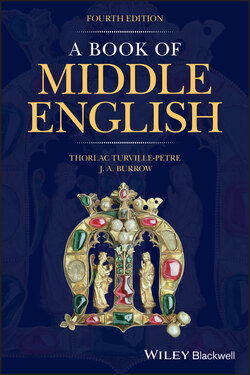Читать книгу A Book of Middle English - J. A. Burrow - Страница 84
5.9.4 Relative Clauses
ОглавлениеA relative þat‐clause is quite often separated from the antecedent to which it refers, and this can cause difficulty since it is not possible in Modern English. In he shal have my soule þat alle soules made, 7b/96, it is obvious enough that the antecedent of the þat‐clause is he and not my soule, ‘he who made all souls shall have my soul’. Less obviously, al studied þat þer stod, 9/237, is ‘all those who were standing there looked intently’, not ‘all looked intently at the one who stood there’, though it is only the context that determines it; and þe man marred on þe molde þat moʒt hym not hyde, 8/479, makes better sense as ‘the man who could not shelter himself suffered on the bare earth’, than as ‘the man suffered on the bare earth that could not shelter him’.
